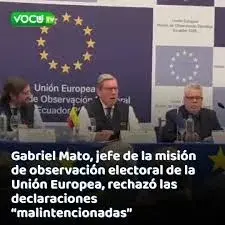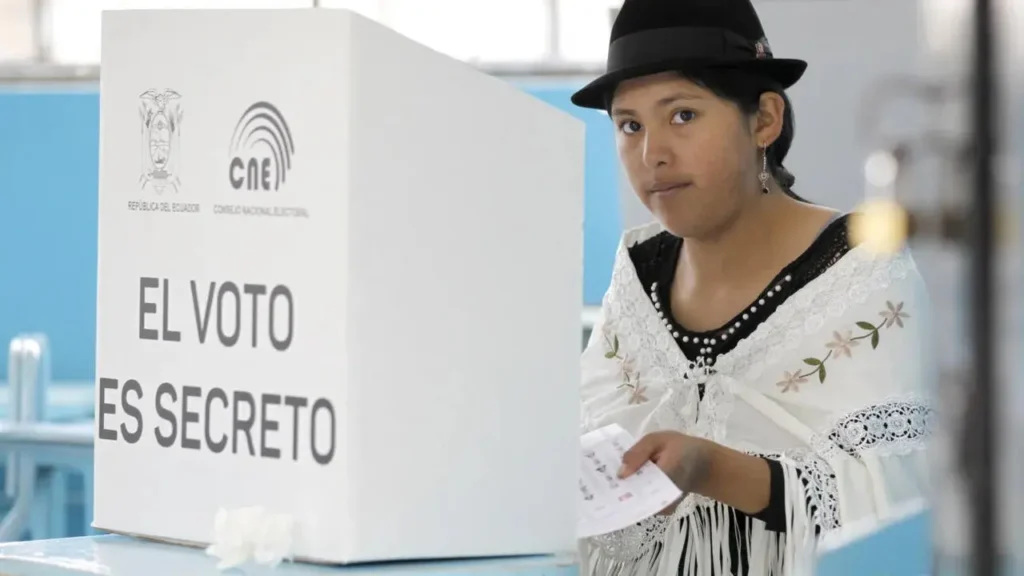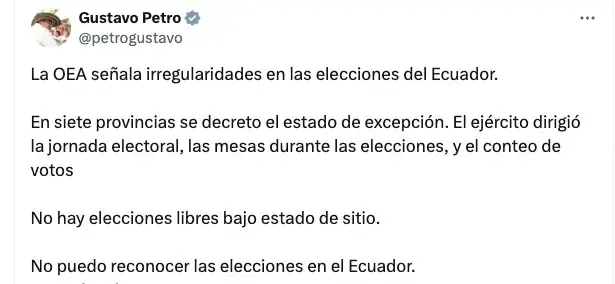
Unlike other Latin American leaders who describe themselves as “defending democracy” and “working for the benefit of the people”, regarding electoral processes, Mexico has acted consistently and avoided double standards. Legality, fair competition, and transparency are required of any country, including Ecuador and Venezuela.
Mexico has suffered Daniel Noboa’s government abuse, but its position, falling short of believing in his rightful victory, is consistent with the one taken regarding Nicolás Maduro’s reelection, giving Mexico a moral authority and a political coherence that appear to be scarce these days.
This principled stance does not seem to be shared by certain governments, international organizations, and mainstream media. Under the guise of “celebrating democracy”, these players are quick to excuse numerous irregularities that, at best, are simply unacceptable, and at worst, are sins of a larger nature.
The questionable election result in Ecuador confirms, if anything, a worrying scenario that the region was already facing and that is worsened by the Donald Trump factor: after two “pink waves” of victories for Democratic-Left parties (the one in the 2000s and the one that began in 2018 with the triumph of López Obrador in Mexico), the right has radicalized and, in practice, is demonstrating its unwillingness to abide by the forms of political civility and even the law, as shown by Bolsonarism in Brazil, Bukele in El Salvador, the defeated coup plotters in Bolivia, the oligarchies in Honduras (2009), Peru, and Paraguay, and now Ecuadorian Noboism.
Irregularities Seen and Noted
Trump himself led the way by questioning his country’s democratic procedures when they do not favor him, to the point of declaring a nonexistent fraud in 2020, attempting a coup d’état in 2021, and preemptively dismissing a possible adverse outcome in 2024.
But international organizations aren’t helping either. It’s hard to expect much from an Organization of American States (OAS) that paved the way for the 2019 Bolivian coup, and from a European Union (EU) that supports and condones the genocide in Gaza and whose main members refuse to comply with the International Criminal Court’s mandate to arrest Israeli Prime Minister Benjamin Netanyahu.
The campaign of the leftist opposition candidate, who polls showed in a technical tie with Noboa but who official results placed 11 points behind, denounced that “thousands of votes for Luisa González unjustifiably disappeared during the count, while Daniel Noboa registered statistically impossible increases in numerous polling stations”. They similarly denied that “dozens of official tally sheets, unsigned and without legal validity, certified exclusively favorable results to Daniel Noboa” and that the population was intimidated to discourage them from voting by declaring a state of emergency exclusively in provinces sympathetic to González, amongst other irregularities also reported by the foreign missions.
The foreign missions aren’t blind. They pointed out that President Daniel Noboa failed to fulfill his constitutional obligation to request a leave of absence and leave his vice president at the helm of the government to campaign for his reelection. They also noted the abuse of state power in his favor and criticized the decision to hold the elections amid a state of emergency.
In a report prior to Sunday’s elections, the OAS “observed with concern that the electoral process was marked by unequal conditions during the campaign,” that there was “misuse of public resources and the state apparatus for proselytizing purposes,” and that “there was uncertainty due to the lack of clear and timely pronouncements” by the National Electoral Council and the Electoral Litigation Tribunal.
For its part, the EU found that the independence and neutrality of the Electoral Council “were once again questioned, both by political parties and civil society organizations,” and noted that the decision to prohibit “the use of electronic devices during voting” led to the Council “being accused of giving in to government pressure.”

Spain’s Popular Party Moving for Noboa
However, these red flags were not enough for them. The head of the OAS mission, Chile’s Heraldo Muñoz, maintained that none of this warrants questioning the legitimacy of the process.
Gabriel Mato, head of the EU group, while acknowledging that the state machinery was mobilized in favor of Noboa, asserted that it was a minor matter: “Can this imbalance justify questioning the election result? From my point of view, it’s a resounding no.”
The European Union sent to observe and evaluate the Ecuadorian election not an impartial diplomat but a member of the European Parliament from the Spanish Popular Party, which, with its ally Vox, has maintained activism in Latin America to counter the “pink wave” and empower right-wing and far-right parties, like Noboa’s.
It’s no surprise, then, that this PP europarlamentarian, Gabriel Mato, went straight from defending the result to attacking critics, expressing his repudiation of “those malicious individuals who have invested great efforts in generating uncertainty among the population, distrust in electoral institutions, and a narrative of massive, systematic fraud, which we reject outright.”

Principle in the Face of Incoherence
The “Hispanic-American” far-right, or the “Iberosphere”, as it likes to present itself, has lost a highly influential campeador in Mario Vargas Llosa, the Nobel Prize winner for Literature born in Peru but naturalized Spanish, who died on Sunday.
They wouldn’t lay down their weapons for this, obviously. The political decisions of democratic, progressive, and left-wing forces must consider that the enemy they face is becoming more like the one of the 1960s and 1970s—the height of dictatorships—than the one of the 1990s, when it believed itself to be the definitive victor of the world battle, proclaimed “the end of history,” and gave itself the luxury of allowing some progress in social struggles.
To confront the challenges of the authoritarian right, whose will for power also means resorting to every legal, paralegal, or illegal means to contain social and political change and subjugate the will of the majority, Mexican President Claudia Sheinbaum’s principled stance in the various electoral processes not only grants her moral authority but also gains coherence and solidity for the democratic left.


Related: Claudia Sheinbaum is the most popular… what can she do with that?
Mexican Press Agency is part of ALMA, which is dedicated to news and information about Mexico and Mexicans in the United States and is a fiscally sponsored project of Social Focus, a 501(c)(3) nonprofit organization based in Redwood City, California.